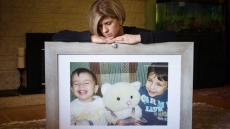HALIFAX — The man she accused of raping her was convicted of sexual assault — but a Nova Scotia woman says she regrets going to the authorities.
Shannon Graham, 22, told police that her common-law spouse, Jared Beck-Wentzell, sexually assaulted her in their home in Bridgewater, N.S. in July 2014. Earlier this year, Beck-Wentzell was convicted of sexual assault and sentenced to two and a half years in prison, but the 23-year-old was released in June pending appeal.
"I got what most people hope to get. I got the conviction. I got the sentence. And yet, he's out free," Graham says. "I sit there and I go, 'What was any of this for?'"
The Canadian Press only identifies victims of sexual assault with their active consent. Graham has asked to be publicly identified and went to court to successfully get a publication ban on her name lifted.
Despite the ostensibly successful trial, Graham said the two-year journey through the legal process has been punishing. At every juncture, Graham says Beck-Wentzell was given the benefit of the doubt, while she says she was treated "like a piece of evidence" and less than "an actual human being."
In July 2014, Beck-Wentzell came home from work to find Graham in bed. The couple had been fighting, and Graham testified at trial that Beck-Wentzell started removing her pyjamas and she said "no." She told the court he continued to sexually assault her while she tried shove him off and repeatedly said "no."
Beck-Wentzell testified that he and Graham were "making out," and told the court he didn't "force her into anything." He said he asked Graham if she "wanted to keep going," and stopped after she said no.
Beck-Wentzell's lawyer, Nicholaus Fitch, said in an interview he will appeal the provincial court's verdict on the grounds that a defence of "honest but mistaken belief in consent" was not considered, and that the judge misunderstood a portion of Beck-Wentzell's testimony.

While waiting for the Nova Scotia Court of Appeal to hear the case, Beck-Wentzell has been released on a peace bond with conditions, including that he stay a certain distance away from Graham and abide by a 10 p.m. curfew.
Experts say Graham's experience is far from uncommon. While advocates urge victims of sexual violence to bring their complaints to the authorities, they acknowledge that the relentless grind of the criminal justice system can dredge up past traumas, and even create new ones, with no guarantee of a favourable outcome.
"I give my evidence, that's my part. How it affects my personal life? How it affected me? That doesn't matter to them," Graham says. "(Victims are) not just something you can pull up to the stand and use as a little puppet."
Graham says she met with Crown prosecutors and members of victims services a few times to prepare for her testimony, but aside from being told where to go and when to show up, it was like she "had no control over anything that involved me."
Statistics Canada found that in 2010-2011, of the nearly 4,000 sexual assault cases completed in adult criminal court, only 42 per cent led to a guilty verdict — the lowest conviction rate for all but one of the violent crimes tracked in the study.
The agency found that around one in ten incidents of sexual assault were reported to the police, according to a 2004 General Social Survey on Victimization. Research from the Department of Justice in 2007 said one factor that could contribute to this low reporting rate is that, compared to other violent offences, a higher proportion of sexual assault allegations are deemed "unfounded" by police.
"The process that we use for responding in sexual assault cases is very difficult for victims," says Wayne MacKay, a law professor at Dalhousie University. "Often, the victims are either revictimized in some way ... or in the case of this person ... felt that they were incidental to the trial."
MacKay says some prosecutors go out of their way to support a sexual assault victim through his or her trial, but that's not always the case — and ultimately, not the Crown's job.

"There is a common misperception that the Crown is the victim's lawyer," says Chris Hansen, a spokesperson for the Nova Scotia Public Prosecution Service, in an e-mail. "Not so. The Crown represents the public interest and his or job is to present the evidence fairly."
Graham says she had no voice or advocate during the trial. A victims services representative expected to meet her while she waited to testify never showed up. The director of victims services blamed a "miscommunication," and said an apology has been offered to Graham.
Graham says she also felt muzzled by a publication ban on her identity, preventing her from responding to what she called "trash talk" in her small community.
"For two years, I sat quietly … I let people spread lies about me. I sat home, since I now do not like to leave my house really ever," she says. "It was very frustrating to know that everyone had the right to say my name, when I couldn't."
MacKay says prosecutors and judges often assume that a publication ban is in the best interest of a victim of sexual assault, sometimes without his or her knowledge or consultation.
"One of the many negative impacts from being a victim of sexual assault is losing a certain amount of your humanity," MacKay says. "(Publication bans) do take out the human element to some extent."
Adults should have more say in the decision to impose a publication ban, says MacKay. He says for some, speaking out about their experience is a way of "reclaiming their own life."
Graham says that's her goal: to reclaim her name so she can tell her story her way.
She wants victims of sexualized violence to know how the criminal justice system works, because she says if she had, she would have sought the help she needed rather than getting the authorities involved.

"Everybody copes with things in different ways," she says. "Whether it's talking to somebody, whatever method that's needed, that's what I would have done, versus going through this for who knows how long.
"Maybe it'll make people look at how the justice system is set up, but I know one person doesn't have the power to change all that. But it might be able to help somebody else."





